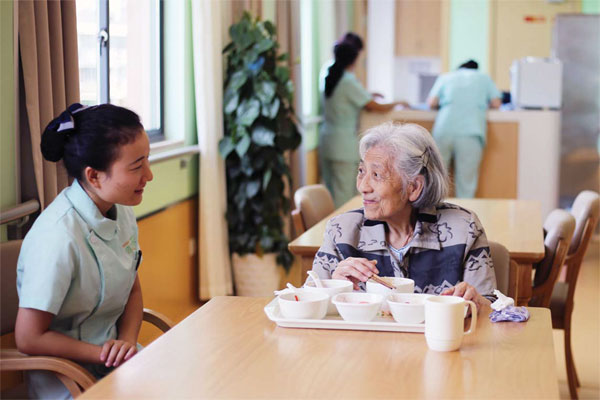Officials strive for quality elder care
By LI LEI | China Daily | Updated: 2024-10-22 10:02

Authorities are stepping up efforts to promote the healthy development of the elder care sector in China, officials said.
Li Yongxin, deputy director of the elder care service department at the Ministry of Civil Affairs, said during a news conference that the number of elderly care facilities in China had surged to around 410,000 by June, with 369,000 of them community-based. This represents a 100 percent increase in elderly care facilities and a 120 percent increase in community-based ones since 2019.
The expansion and a recent crackdown are part of a broader initiative to address the challenges posed by China's rapidly aging population and fraudulent practices in facilities designed to help seniors.
"The ministry has strengthened its policy framework, diversified care options and enhanced regulatory measures, resulting in significant improvements in elderly care services," Li said.
Li added that legislative efforts are underway to create a law outlining the responsibilities of elder care service providers, with the goal of better protecting seniors' rights. The move is a response to widespread concerns about financial scams targeting the elderly, including fraudulent schemes disguised as membership fees or unauthorized financial products being offered by some retirement homes.
In 2022, a government crackdown on elder care fraud led to the arrest of 66,000 suspects and the recovery of 30.8 billion yuan ($4.3 billion) in stolen funds. Last year, an additional 33,000 suspects were apprehended.
Along with fraud prevention, authorities are conducting inspections to reduce fire risks, improve building safety and create a more secure environment for seniors. The National Health Commission estimates that 78 percent of China's elderly people have at least one chronic illness, and roughly 40 million seniors are disabled or semidisabled and require intensive care.
Meanwhile, despite the growing number of elder care facilities, China still faces a shortage of caregivers, with only 500,000 currently available to meet the country's needs. To fill the gap, authorities are promoting home-based care that allows seniors to stay in their homes while receiving regular visits from community workers and medical professionals.
Since 2021, approximately 350,000 seniors have benefited from home-based care, with 650,000 home visits conducted, according to the ministry.
By the end of 2023, nearly 300 million Chinese citizens were age 60 or older. By 2050, that number is expected to grow to one-third of the population.
lilei@chinadaily.com.cn
























